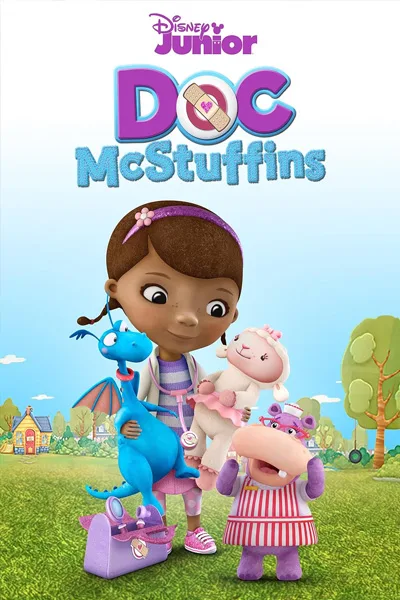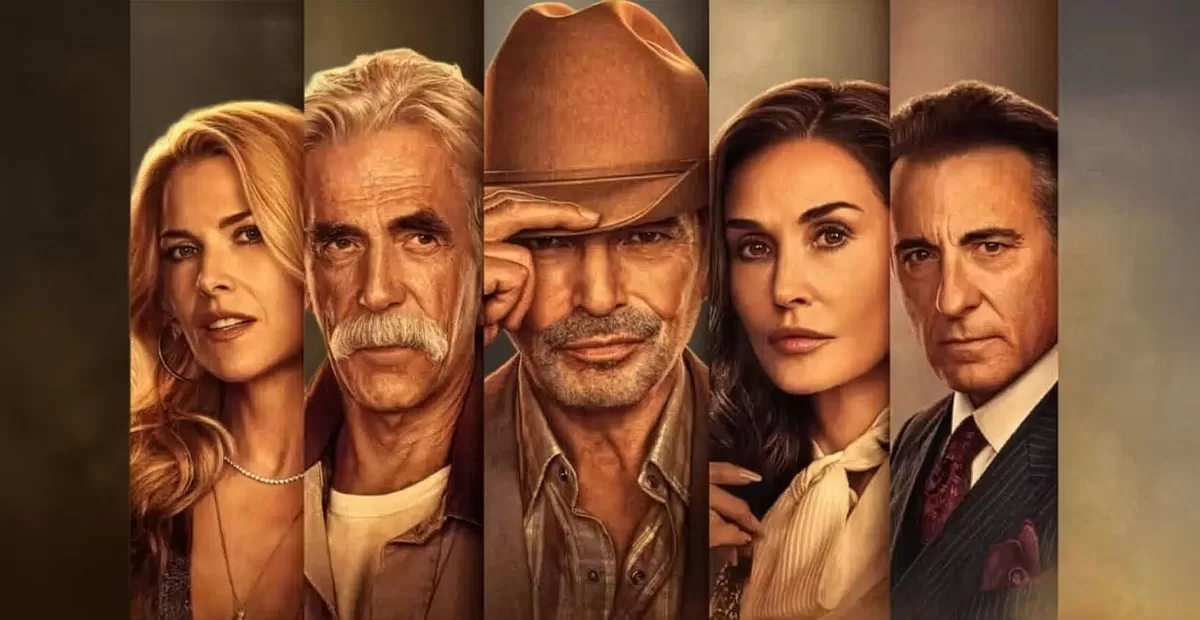
- Starring
- Lara Jill Miller, Loretta Devine, Robbie Rist
- Creator
- Chris Nee
- Rating
- G
- Genre
- Animation, Children, Family, Fantasy, Musical
- Release date
- March 23, 2012
- Where to watch
- Disney+
Overall Score
Rating Overview
Rating Summary
Doc McStuffins is an animated series on Disney+ that follows six-year-old Dottie “Doc” McStuffins as she dreams of becoming a doctor like her mother. With her magic stethoscope, Doc brings toys and stuffed animals to life and runs a clinic in her playhouse, helping them feel better with the assistance of her stuffed animal friends: Stuffy the Dragon, Hallie the Hippo, Lambie the Lamb, and Chilly the Snowman.
Doc McStuffins Mini-Review (S4: E22)
Doc McStuffins is a cute idea but is otherwise yet another dose of high-fructose laden brain candy meant to transform your children into quiet drooling zombies. Sure each episode proposes to teach a lesson like, the benefits of having an emergency plan, but it’s been done so much better in the past that it’s impossible to not compare it to the greats like Mr. Roger’s Neighborhood and classic episodes of Sesame Street.
Those programs did so much more than spoon feed docility and solitary overly simplistic lessons to children. They were full programs with texture and depth. Doc McStuffins is barely a step above jangling keys.
PARENTAL NOTES
It’s For Toddlers
- See the Woke Report below. If it weren’t for the obvious indoctrinational attempt, this episode would be safe, if mind numbing.
WOKE REPORT
Mum’s the Word
- It only takes 30 seconds after the musical intro concludes to introduce a little boy character’s two mothers, voiced by outspoken lesbians Wanda Sykes and Portia de Rossi. The two are prominently featured throughout the episode and, while this is the only episode of the series that features them, the show’s creator has said that they are regularly in the background of other episodes to remind children of their existence in the world.
- The creator has also indicated that the decision to include the homosexual mothers was explicitly to normalize it in the hearts and minds of children.
Mr. Mom
- It’s not shown in this episode, but my understanding is that McStuffin’s parents portray non-traditional gender roles, with the mom being a doctor and the dad cooking, cleaning, and emotionally nurturing the children.
James Carrick
James Carrick is a passionate film enthusiast with a degree in theater and philosophy. James approaches dramatic criticism from a philosophic foundation grounded in aesthetics and ethics, offering insight and analysis that reveals layers of cinematic narrative with a touch of irreverence and a dash of snark.






One comment
Sweet Deals
October 14, 2025 at 7:57 am
Doc McStuffins is a bright young girl who uses her magical stethoscope to bring toys to life. It’s very useful in her job repairing damaged toys for the benefit of their owners. Doc makes clear observations and uses sensible logic when she does her repairs, and she also has a very gentle and kind beside manner and listens to her patients whenever they have a problem. The show cleverly uses stories about fixing broken toys as analogies for real medical conditions and anxieties that real children may have. Doc McStuffins treats its subject matter very gently, sometimes too gently. Like many shows of its era, Doc McStuffins is highly saccharine, especially when Doc and her toys are singing playful songs about things that most ordinary children and parents would consider preachy or nagging, such as washing your face or wearing a helmet. In the first three seasons, Doc McStuffins repairs toys in a clubhouse in her backyard she calls her “clinic”. By the fourth season, the show changes focus to Doc running a full-sized hospital for toys in a magical world inhabited entirely by living toys.
Disney didn’t have a “not-so-secret gay agenda” in 2012 when Doc McStuffins was first created. However, while reviewing the series, I discovered an episode late in the fourth season (“The Emergency Plan”) that featured a family with two mothers. They were not a human family, but a toy family, and in true intersectional fashion, they were also an interracial black-and-white couple. This episode came out in 2017; the same year I stopped visiting the public library because I saw a staggering increase in children’s books that were discreetly normalizing homosexuality by sneaking it into narratives where it wasn’t necessary in order to make it appear more ordinary than it is. In my book, homosexuality has no business being in anything intended for children. It’s not simply because I consider homosexual lifestyles to be unhealthy and inappropriate. It’s also an ideological litmus test for me. If your book or show is willing to compromise objective truths for the sake of “compassion” or social relevance, then I become suspicious of whatever follows because there’s no telling what other things you might be lying about and what other warped lessons you might be trying to teach. It erases all of the goodwill that the show had otherwise built up over the years.
Which leads me to a much later episode. “The Great McStuffins Meltdown” is a special double-sized movie episode in the fifth season. Doc upgrades her toy hospital with so many machines it’s almost entirely automated. However, she later discovers that the amount of electricity her new hospital uses is causing the Toy Arctic to melt and is endangering all the toys who live there. Why? Because there’s a giant power strip buried underneath the Toy Arctic, and all the extra electricity flowing out of it is causing it to overheat. The only solution is to turn off the switch and leave the entire town of McStuffinsville in the dark, and then change their power supply to green energy. This episode came out in 2020 and is exactly the sort of thing I worry about when the appearance of being socially relevant becomes more important than honesty. It’s a bad quality to have if you’re a doctor who wants your patients to consider you and your advice to be trustworthy.